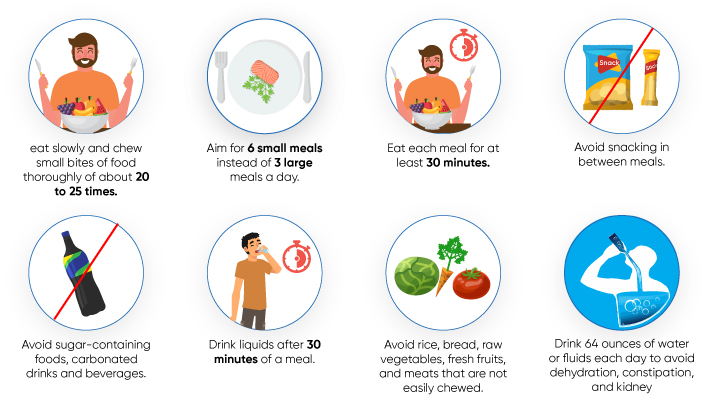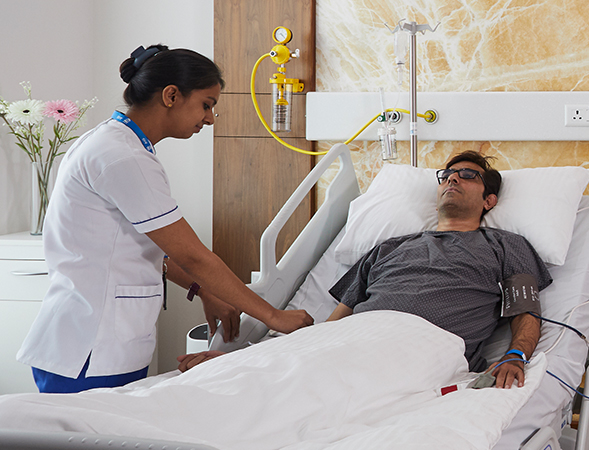Bariatric surgery is performed in severely obese people to reduce weight. Though bariatric surgery is a long-term weight loss solution, after bariatric surgery, the patient needs to make several lifestyle changes including diet, exercise, medications, smoking, alcohol, etc. to lose weight and maintain good health. Some of the lifestyle changes after bariatric surgery are discussed below.
-
Diet +

After bariatric surgery, it is essential to follow the specific dietary measures recommended by the health care provider. These dietary guidelines help to limit the number of calories consumed, prevent nutritional deficiencies and preserve the muscle mass.
The diet plan is customized based on the patient’s health needs and the type of weight loss procedure performed. Soon after surgery, clear liquid diet is started, followed by full liquids, then pureed food and soft foods, and eventually to solid foods. Vitamin and mineral supplements should be taken on a daily basis to prevent nutrient deficiencies. It is recommended to take 60-100g of protein daily to maintain healthy muscle tissue.
Dietary recommendations:

Some of the dietary measures that a patient needs to follow to maximize the outcomes of bariatric surgery include:
- Eat slowly and chew small bites of food thoroughly of about 20 to 25 times.
- Aim for six small meals instead of three large meals a day.
- Eat each meal for at least 30 minutes.
- Avoid snacking in between meals.
- Avoid sugar-containing foods, carbonated drinks and beverages.
- Drink liquids after 30 minutes of a meal.
- Avoid rice, bread, raw vegetables, fresh fruits, and meats that are not easily chewed.
- Drink 64 ounces of water or fluids each day to avoid dehydration, constipation, and kidney stones.
-
Medications +

For obesity-related health problems, the doctor may either reduce the dose or stop the medications completely after surgery. Some medications will be prescribed after surgery which needs to be either for a few months post-surgery or lifelong. Some of these medications include acid reducing medications, such
as Omeprazole, which helps to prevent ulcers. If the person has gall bladder, a medication called ‘ursodiol’
is prescribed to prevent gallstones.Pills will not be absorbed as before surgery, and they have difficulty passing through the new digestive system. So, the pills should be crushed, and the capsules should be opened before swallowing.
Extended release medications will not be absorbed properly, as the digestive tract is completely changed
after surgery. So, these medications should be substituted with other medications that do not have a
time-release component.Avoid the over-the-counter medications like painkillers, such as aspirin, ibuprofen, as these medications can increase the risk of developing ulcers after bariatric surgery.
-
Exercise +
 Along with the healthy diet, exercise is also essential for long-term weight management. Initially, after bariatric surgery, it is recommended to walk for five minutes in the morning and five minutes in the evening. Then gradually increase the duration of walking to 15 minutes twice daily. Once the patient is able to tolerate walking, other activities to the exercise, such as swimming, cycling, and jogging can be added.
Along with the healthy diet, exercise is also essential for long-term weight management. Initially, after bariatric surgery, it is recommended to walk for five minutes in the morning and five minutes in the evening. Then gradually increase the duration of walking to 15 minutes twice daily. Once the patient is able to tolerate walking, other activities to the exercise, such as swimming, cycling, and jogging can be added.After complete recovery, exercising for 30 - 45 minutes per day, with cardio or aerobic activity three to five times a week is recommended. Resistance exercises help to improve muscular strength and endurance as well as burns excess calories, as bigger muscle needs more calories even at rest. Start with a low weight and gradually increase the weight as tolerated.
-
Mental health +
 After bariatric surgery, some people may take time to get adjusted to lifestyle changes and body changes. These adjustments may impact work, socialization and relationships. In some people, eating habits are frequently affected by stress, emotions, boredom, mindless eating, or even eating disorders. People with such problems should seek advice from an experienced mental health professional.
After bariatric surgery, some people may take time to get adjusted to lifestyle changes and body changes. These adjustments may impact work, socialization and relationships. In some people, eating habits are frequently affected by stress, emotions, boredom, mindless eating, or even eating disorders. People with such problems should seek advice from an experienced mental health professional. -
Sleep and stress +
 Having sufficient sleep is important in the successful weight loss after surgery. To improve sleeping habits, avoid caffeine in the evening, exercise in the morning and avoid exercising for few hours before bedtime,
Having sufficient sleep is important in the successful weight loss after surgery. To improve sleeping habits, avoid caffeine in the evening, exercise in the morning and avoid exercising for few hours before bedtime,
and maintain a bedroom ambience that is not too bright, and is soothing. Patients with obesity-related
sleep apnea should continue treatment even after surgery to prevent sleep disturbances.Stress management is also important in weight loss after surgery. Stress can be relieved by involving in exercise or calming habits, such as meditation or yoga.
-
Smoking +

Smoking should be stopped from six weeks before the surgery to prevent any risks during surgery and also to avoid complications after the surgery. Smoking or chewing tobacco reduces blood supply to the body tissues and delays healing. Complications associated with smoking include blood clots, heart diseases, ulcers, stroke, lung diseases, high risk of hip fracture, cataracts and cancers.
-
Alcohol +

Alcohol consumption should be avoided after bariatric surgery for the following reasons.
- After surgery, when the patient takes alcohol, they may consume less food due to their small size of stomach pouch. Due to the altered metabolism, there will be increased absorption of alcohol into the blood stream. This results in the higher alcohol levels in the blood causing alcohol intoxication.
- Reduced carbohydrate intake after surgery may decrease the sugar or glycogen levels in the body. Alcohol consumption may further decrease the sugar levels leading to hypoglycemia (low blood sugar).
- Alcohol is high in calories and low in nutrients, which may affect the weight loss if consumed after surgery.
- In some people, prolonged alcohol consumption may lead to alcohol dependence.
-
Pregnancy and birth control after bariatric surgery +

It is recommended to avoid pregnancy during the period of significant weight loss (the first 12-18 months after bariatric surgery). During this period, the nutritional status is poor, which may affect the developing fetus and may lead to fetal complications or birth defects. Seek medical advice to use the best type of contraception during this period to avoid pregnancy, as most of the birth control pills and injections are less effective in obese patients and in women in the rapid weight loss phase. If a woman becomes pregnant or is planning to become pregnant during this phase, she should consult the doctor immediately to avoid any risks to the developing fetus.
-
Follow-up care +

A patient must go regular follow ups as prescribed by the doctor for the following reasons:
- To check for the surgery outcomes
- To find if the patient is adhering to the diet plan
- To see if there are any adjustments needed in the diet or medication plan
- To check for post-surgical complications
References
https://asmbs.org/patients/life-after-bariatric-surgery
https://medlineplus.gov/ency/patientinstructions/000350.htm
https://www.ucsfhealth.org/education/life-after-bariatric-surgery
https://www.nhs.uk/conditions/weight-loss-surgery/afterwards/
- 1


